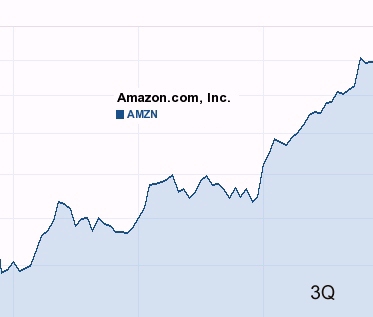
It’s a special time of year — when major corporations finally reveal the secret numbers about how their companies performed over the previous 13 weeks. Yesterday Amazon released their own quarterly earnings reports, right in the middle of a week of rumors and predictions about tablet-sized reading devices. Amazon reminded investors that the newest generation of Kindles are “the fastest-selling Kindles of all time.” And they’re also the #1 best-selling product on Amazon — both in America and Britain.
“A sour economy failed to slow down Amazon.com,” reported the New York TImes, “as the company’s net sales climbed 39 percent in the third quarter.” But what’s more interesting is what they didn’t say. A financial analyst in San Francisco believes that this year, Amazon will earn a whopping $2.8 billion from their Kindles and ebook purchases, according to Bloomberg news. And within two years, that number could nearly double, to $5.3 billion in 2012!
That’d break down to the equivalent of 15 million Kindles sold in 2010, and 30 million in 2012 — though some of the profits obviously are coming from ebook sales. But what’s even more interesting is the analyst’s second comment. Kindle users “will not only continue buying more e-books, but also subscriptions, accessories, [and] hardware warranties,” he predicted, saying eventually the devices would be used to deliver music and even full-motion video. Will Amazon eventually open up new stores for Kindle music and Kindle video?
And that’s where the first rumor gets a lot more interesting. While Amazon was announcing their quarterly results, C|Net also reported that this Tuesday, Barnes and Noble will reveal a digital reader with a full-color touch-screen — the “Nook Color,” priced at $249. “It’s a big step ahead, instead of chasing Amazon,” their source explained, adding that it’d be based on Google’s popular Android operating system, and would sell for half the price of Apple’s tablet-sized iPad. It’d ship with a 7-inch color screen — which is a magic dimension size that has already been generating some controversy.
“One naturally thinks that a seven-inch screen would offer 70 percent of the benefits of a 10-inch screen,” Apple’s Steve Jobs told analysts Tuesday when announcing their own quarterly earnings. “Unfortunately, this is far from the truth. The screen measurements are diagonal, so that a seven-inch screen is only 45 percent as large as iPad’s 10-inch screen. You heard me right: just 45 percent as large…
The seven-inch tablets are tweeners: too big to compete with a smartphone, and too small to compete with an iPad.”
Jobs insisted that his comments were based on Apple’s “extensive user testing on touch interfaces over many years…we really understand this stuff.” But the truth probably lurks somewhere between the lines. Reading devices have proven to be so popular, that none of these companies want to get left behind. It’s not just that Amazon’s Kindle-related profits are probably already in the billions of dollars. It’s that selling us millions of Kindles means we’ll keep using Amazon’s store for our future purchases — of e-books today, but maybe also for music-and-video purchases in the future. So while I’m casually reading my e-books, major corporations are already fighting the war of tablet-sized reading devices.
And honestly, I’m not sure how I feel about all this speculation. I just worry that someday we’ll look back with a fond nostalgia to the Kindle 1. “It didn’t offer full-motion color video on high-definition screen,” we’ll say.
“But it was really great for reading books.”
Great analysis. I have the Kindle 3, as those before I deemed to be too expensive, though I’ve been reading on PDA’s for 12 years. The experience of reading on the K3 is stellar and is one of the reasons why I’ve resisted the temptation to buy games or other apps for it, as that’s the reason why my reading dropped off after I got too many time-wasting apps on my PDA’s, especially the iPod Touch.
As regards Kindle users spending in the Amazon ecosystem, it’s not just limited to eBooks, music and movies. I’ve already purchase many hardware and other items I wouldn’t have purchased from Amazon were it not for the tie-in the Kindle gave me to their store.
Hmmmm….